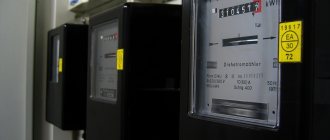The fine for the theft of electricity does not seem to frighten Russians: the widespread theft of electricity still remains one of the main problems of domestic grid companies. Despite all the efforts of energy workers, the scale of theft continues to grow: in some regions, up to half of all consumers steal electricity, and one in five are caught again.
To combat such repeat offenders, Russian senators recently adopted amendments to the Administrative Code: now you will have to pay more for a second violation. Let's figure out how they will now punish for stealing electricity and what other dangers there are for flirting with utility workers.
How electricity is stolen
Illegal connection to the public power grid is one of the most daring ways not to pay.
However, there are other popular methods to reduce utility bills by manipulating the readings of conventional meters:
- the zero contact of the meter is replaced by a grounded structure (plumbing or fittings);
- a separate line cuts into a branch to the meter - the device is simply excluded from the circuit;
- “zero” and “phase” of the counter change places - the device begins to “wind” in the opposite direction;
- A powerful neodymium magnet is placed on the meter body - the mechanism stops.
Here and there you can find outdated disk counters , which are stopped even easier: a match or thin metal wire is passed through a tiny hole in the case, as invisible as possible to the inspector, stopping the disk. In case of inspection, the stopper can be removed and the hole masked - and all hope remains for the inspector’s inattention.
Since Russians' meters are usually located inside apartments, owners can manipulate the devices unnoticed. But monitoring organizations are constantly improving methods for detecting such “kulibins”. All modern meters are equipped with an anti-magnetic seal - it allows you to prove that the payer tried to use a magnet, essentially making this method of passing kilowatt-hours past the meter useless.
Utilities can also determine the fact of non-contractual use of the electrical network based on a complaint from neighbors or by analytical methods. The appearance of a “parasite” on the network is indicated by increased meter readings for residents of one house or entrance, or a sharp decrease in consumption in a separate house or apartment. These races may be a reason to visit a suspicious owner. If these suspicions are confirmed, he will be punished to the fullest extent.
The whole truth about the theft of electricity and its use
What have today’s “Kulibins” invented to save on electricity?
There are also more modern approaches to stealing electricity. So, recently the so-called extraneous zero method has become popular, when the phase wire passes through the electric meter, and the neutral one is powered from another place. The electricity in the house does not disappear, but the meter stops counting.
The only good thing is that there are only a few such innovators in the area, and cases of theft are becoming less and less every year - the penalties provided for this offense are too large, and it is quite difficult to hide traces of connections.
- It's quite simple.
How to punish for theft
Violation of the verification period by three months may lead to the fact that payment will be calculated based on the standard using a multiplying factor . It is currently set at 1.5. This is not considered a fine in the full sense of the word. But it will no longer be possible to return the overcharged payments, even if everything turns out to be in perfect order with the device.
As for completely faulty meters, owners face more serious sanctions. Owners are required to notify suppliers within a month if the metering device fails . Failure to fulfill this obligation may be perceived by the network company as concealing the fact of a breakdown. And this falls under unaccounted theft of electricity.
The punishment for this is established by Article 7.19 of the Code of Administrative Offenses of the Russian Federation in the form of an administrative fine.
The size of the sanction depends on the status of the violator:
| Individuals (citizens) | 10,000—15,000 rubles |
| Officials | 30,000—80,000 rubles |
| Legal entities | 100,000—200,000 rubles |
If the amount of proven damage to the network company amounts to more than 250 thousand rubles, the case may well reach criminal liability under Article 165 of the Criminal Code of the Russian Federation. It provides for a fine of up to 300 thousand rubles, up to a year in prison or up to two years of forced labor.
What is intentional damage?
For a meter on which the seal is damaged or the integrity of the case is compromised, the law provides for a similar punishment, qualifying any damage to the device by an individual (as well as an individual entrepreneur and a representative of a legal entity) as intentional. In this case, the presumption of guilt . The owner of the electric meter is responsible for providing evidence that the device was damaged accidentally.
Finally, modifications to the electrical network and manipulations, obviously intended to deceive the network company, do not leave the “frugal” owner any opportunity to justify himself. As a rule, the management company goes directly to court, demanding compensation for losses.
However, Russians are not afraid of such a prospect. According to Rosseti, up to 8% of people punished for unauthorized connection did so again within a year.
Is there any criminal liability for electricity theft?
There are a number of circumstances that determine the type of liability for the guilty person. Criminal punishment also occurs, but it is applied only in exceptional situations, or rather, in the presence of two factors:
- the consumption of electricity was for selfish purposes or malicious intent;
- the amount of damage caused is 250 thousand rubles or more.
The resource supplier or energy supply company has the right to file a complaint against the person at fault. Here it will be necessary to confirm the reality of fraudulent actions and determine how much resources were stolen during private consumption.
To detect theft, suppliers regularly check metering devices, and if they detect problems with the operation of this device, they draw up a corresponding report.
Important! Further actions of the guilty person may vary. It has the right to challenge the issued act in court or pay the debt in full.
When drawing up the act, the amount of damage is taken into account. If it is 250 thousand rubles or exceeds this amount, then the case will be considered a criminal offense.
How the law is being tightened
According to some experts, Russian power grid companies lose about 10 billion rubles annually due to theft.
It is natural that they decided to turn to the authorities. And they quickly adopted appropriate amendments to the Code of Administrative Offenses of the Russian Federation, providing for tougher sanctions for those persons who were repeatedly caught stealing electricity.
Punishment for illegal consumption for repeat offenders also depends on the status:
| Individuals (citizens) | 15,000—30,000 rubles |
| Officials | 80,000—200,000 rubles |
| Legal entities | 200,000—300,000 rubles |
If previously the usual punishment for an individual who decided to “rewind” the meter was a fine of 10,000 rubles, now each such episode can cost 30,000 rubles .
Senators have not yet changed the criminal punishment for unaccounted for insertion. But there are reasons to think it's only a matter of time. Thus, an initiative group of United Russia deputies has already sent to the Duma a bill that would provide for punishment of up to six years in prison for energy theft. At that time this project was rejected. But the general vector of thinking of the deputies is clear.
Theft of electricity through grounding
If someone decides to use a water pipe as ground in an apartment, then he should know that he is putting someone’s life in mortal danger. The fact is that in normal condition, water pipes are actually connected to the ground (unless some kind of polymer pipe connections are used), but in the case of, for example, repairing a pipe, when it is cut below the connection point of the grounding conductor, there is a direct threat to life person touching the pipe.
What to do when disconnected
Not all electricity thieves act from criminal motives. Sometimes this is a forced measure associated with disconnecting housing from the network for non-payment.
In such a case, it is easier to pay additional penalties than to risk huge fines and imprisonment for the accumulated debt. But if the housing was not connected at all or was technically cut off from the common line, the procedure will be a little more complicated.
The correct procedure after disconnecting:
- an application for (re)connection is submitted to the management company or directly to the electricity supplier;
- the owner receives permission from Rostechnadzor - only for facilities with a power of over 100 kW (for legal entities) or over 15 kW (for individuals);
- a new technical connection agreement is concluded with the service provider;
- The supplier's representative travels to the site that requires connection and performs work under the contract. Including installing meters (in case of absence);
- The network company supplies electricity to the consumer and draws up the corresponding act.
Thus, for illegal manipulations with meters you can now lose 30,000 rubles. No one has abolished criminal liability for particularly large thefts. And soon the punishment may become even tougher. So you should think twice before deceiving an online company. A reconnection procedure is available for persistent defaulters.
On what basis can utility workers turn off the lights?
This right is enshrined in Art. 119 of the Decree of the Russian Federation “On the provision of utility services to owners and users of premises in apartment buildings and residential buildings.”
In doing so, they must follow a certain order:
- First, a notice is sent stating that if the debt is not repaid within 20 days, the service will be first limited and then suspended. If it is not possible to restrict the service, its provision will be suspended without an intermediate step.
Important! A notice is considered given only if there is confirmation of it. This means that it must be handed over to the debtor against receipt or by registered mail with acknowledgment of receipt. If this is not done, further “sanctions” will be illegal. The service provider may use other methods of transmitting a message: a call with a recording, an email with confirmation of receipt, information through the state housing and communal services information system or the Internet.
- If the consumer ignores the warning and does not pay the fee, the provider may limit consumption of the service. If this does not lead to results, the provision of the service may be suspended. Exceptions are heating and cold water supply in apartment buildings. Electricity may be cut off if you do not respond to the demand to pay in time.
Complete restriction or suspension of the provision of services - cessation of the supply of electrical energy.
Methods for detecting electricity theft
Methods for identifying facts of “theft” of electricity and determining punishment for such crimes are quite varied. They are mainly classified into 2 areas - practical and analytical.
Analytical - relies on an indirect search for cases of electricity theft:
- periodic reconciliation of the readings of communal meters with the load of individual residents;
- identifying low meter readings that do not differ significantly from month to month. In this way, it seems possible to identify consumers - thieves; they usually designate for themselves a certain volume of a resource for which they are willing to pay over a certain period of time;
- identifying discrepancies in meter readings when collecting them;
- detection of load discrepancies using current-collecting equipment. Usually a significant load is recorded with virtually unchanged meter readings.
A practical method for detecting electricity theft includes:
- load control in the general house power supply network;
- visual inspection of electricity meters, helping to determine whether the meter is disconnected from the network and replacing the neutral wire with a phase.
Zero" on the pipe: what is the risk of stealing electricity
The event was presented as a bomb threat to a high-rise building. Are “games” with electricity really so dangerous? We asked the specialists of the Slavyansk Gas Management Department - senior foreman of the in-house gas equipment service Vladimir Anastasyev and head of the electrochemical protection service Alexander Shirinsky.
The principle of theft of electricity through intra-house communications is that instead of the zero contact of the socket, a water supply or heating pipe is used.







